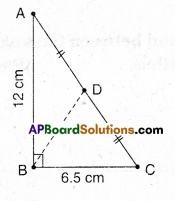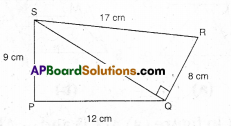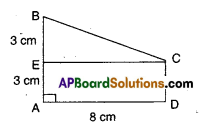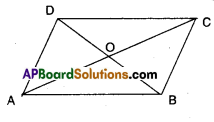AP State Syllabus AP Board 9th Class Maths Solutions Chapter 11 Areas Ex 11.1 Textbook Questions and Answers.
AP State Syllabus 9th Class Maths Solutions 11th Lesson Areas Exercise 11.1
![]()
Question 1.
In ΔABC, ∠ABC = 90°; AD = DC; AB =12 cm, BC = 6.5 cm. Find the area of ΔADB

Solution:
ΔADB = \(\frac { 1 }{ 2 }\) ΔABC [ ∵ AD is a median of ΔABC]
\(\frac { 1 }{ 2 }\) = [ \(\frac { 1 }{ 2 }\) AB x BC]
= \(\frac { 1 }{ 4 }\) x 12 x 6.5
= 19.5 cm2
![]()
Question 2.
Find the area of a quadrilateral PQRS in which ∠QPS = ∠SQR = 90°, PQ = 12 cm, PS = 9 cm, QR = 8 cm and SR =17 cm.
[Hint: PQRS has two parts]

Solution:
Area of ΔQPS = \(\frac { 1 }{ 2 }\) x base x height
= \(\frac { 1 }{ 2 }\) x 9 x 12
= 54cm2
In ΔQPS
QS2 = PQ2 + PS2
QS = \(\begin{aligned}
\sqrt{12^{2}+9^{2}} &=\sqrt{144+81} \\
&=\sqrt{225}=15
\end{aligned}\)
Area of ΔQSR =\(\frac { 1 }{ 2 }\) x base x height
= \(\frac { 1 }{ 2 }\) x 15 x 8 = 60 cm2
∴ □PQRS = ΔQPS + ΔQSR
= 54 + 60= 114 cm2
![]()
Question 3.
Find the area of trapezium ABCD as given in the figure in which ADCE is a rectangle.
[Hint: ABCD has two parts]

Solution:
Area of trapezium 1
= \(\frac { 1 }{ 2 }\) (sum of parallel sides) x (distance between the parallel sides)
= \(\frac { 1 }{ 2 }\) (a + b) h
From the figure, a = 3 + 3 = 6 cm
b = 3 cm
(∵ Opp. sides of rectangle)
h = 8 cm
∴ A = \(\frac { 1 }{ 2 }\)(6 + 3)x8 = 36cm2
![]()
Question 4.
ABCD is a parallelogram. The diago-nals AC and BD intersect each other at O. Prove that ar (ΔAOD) = ar (ΔBOQ. [Hint: Congruent figures have equal area]

Solution:
Given that □ABCD is a parallelogram.
Diagonals AC and BD meet at ‘O’.
In ΔAOD and ΔBOC
AD = BC [ ∵ Opp. sides of a ||gm]
AO = OC [ ∵ diagonals bisect each
OD = OB other]
ΔAOD = ΔBOC [S.S.S. congruence]
∴ ΔAOD = ΔBOC (i.e., have equal area)